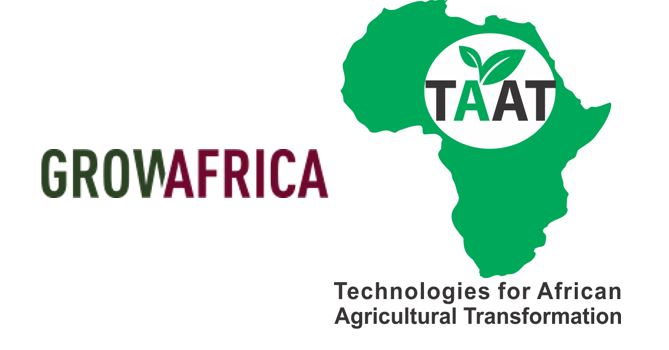
Technologies for African Agricultural Transformation (TAAT) and Grow Africa Partnership will be hosting a webinar on the 5th of November 2020 between 14h00-16h00 (WAT).
With the theme “Technology-driven modernisation of African Agriculture – what role for the private sector”, the webinar aspires to shape an important conversation on the central role of the private sector in technology generation and adoption for agriculture.
Modernising agriculture in Africa through the adoption and dissemination of proven technologies has become an absolute imperative especially in the wake of COVID-19-related shocks on the continent’s weak food systems.
However, Africa is yet to feel the impact of the catalytic role of the private sector in steering innovative developmental efforts towards industry needs and societal access. Hence the need to exchange ideas on experiences and models used in linking agricultural research initiatives with private sector engagement.
The webinar will be an opportunity to exchange views on the crucial importance of private sector role and engagement and to share success stories and good practices that could be leveraged upon for advancing the course of agricultural development into the future, through strengthening private sector engagement and collaboration.
The two-fold objectives of the webinar revolve around bringing together leading strategists and advocates of technology-driven agriculture to assess the current state of affairs and brainstorm on possible collaboration in a post-COVID-19 context; and sharing experiences and models used by private sector/agricultural research institution engagements in deploying technologies to transform African and assess the scalability of some of the models readily accessible across the continent.
The director, Agriculture and Agro-Industries at the African Development Bank, Dr. Martin Fregene and the Chief Operation Officer, Grow Africa, Mr Ibrahim Gourouza-Magagi will speak at the webinar while Mr. Frederick Schreurs – CEO, Business Incubation Platform of the International Institute of Tropical Agriculture (IITA), Dr. Adeniyi Adediran, Leader of the TAAT Livestock Compact at the International Livestock Research Institute (ILRI), and Dr. Josey Kamanda, Leader of the TAAT High Iron Beans Compact at the Alliance of Bioversity and CIAT (ABC) will be the panelists.
Other panelists include Mrs. Ndidi Okonkwo Nwuneli, Managing Partner, Sahel Consulting Ltd, Mr. KEBBA COLLEY, Director of Inclusive Business Development, IDH, and Mr. Tunde Kara, CEO, Vendease (Africa’s online marketplace)
TAAT & GROW AFRICA
Technologies for African Agricultural Transformation (TAAT) is a programme sponsored by the African Development Bank (AfDB) as an integral part of its Feed Africa Strategy of 2016–2025.
TAAT’s overall objective is to harness high-impact, proven agricultural technologies to raise agricultural productivity in Africa; mitigate risks and promote diversification and processing in 18 agricultural value chains within eight priority intervention areas. Through the support to the TAAT Clearinghouse by Bill and Melinda Gates Foundation (BMGF), the investment is intended to improve the quaity of agricultural transformation projects and to ensure that they include modern productivity-enhancing technologies already available and proven on the continent.
Within two years of implementation, TAAT has recorded successes in deploying proven technologies to African farmers at scale – enabling them to increase yields and improve their livelihoods in a sustainable manner.
The programme has achieved a considerable increase in agricultural productivity across the continent through the deployment of proven and high-performance agricultural technologies along selected commodity value chains: Maize, Rice, Wheat, High Iron Bean, Cassava, Orange-Fleshed Sweet Potato, Sorghum/Millet, Livestock and Aquaculture.
It has equally recorded success stories in addressing transversal issues affecting African agriculture ranging from policy to soil fertility, capacity development and technology outreach, water management, fall armyworm response and engaging African youths in agribusiness.
The Grow Africa partnership was founded jointly by the African Union (AU), the New Partnership for Africa’s Development (NEPAD Agency) and the World Economic Forum in 2011. Grow Africa works to increase private sector investment in agriculture, and accelerate the execution and impact of investment commitments. The aim is to enable countries to realize the potential of the agriculture sector for economic growth and job creation, particularly among farmers, women and youth.
Grow Africa also facilitates collaboration between governments, international and domestic agriculture companies, and smallholder farmers in order to lower the risk and cost of investing in agriculture, and improve the speed of return to all stakeholders. Grow Africa helps establish value chain specific multi-stakeholder partnerships at the national level and engages locally through these companies.
The broader Grow Africa network includes farmer, civil society, development, and research organizations. Grow Africa’s work is fully anchored within the national and continental policy architecture of the Comprehensive Africa Agriculture Development Programme (CAADP), which is to improve food and nutrition security, and increase incomes in Africa’s largely farming-based economies.










